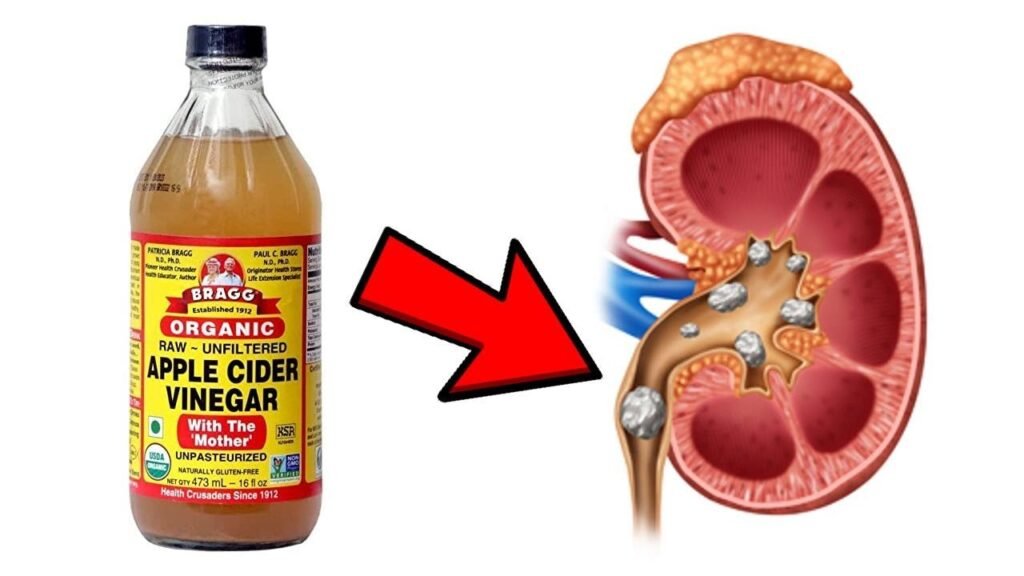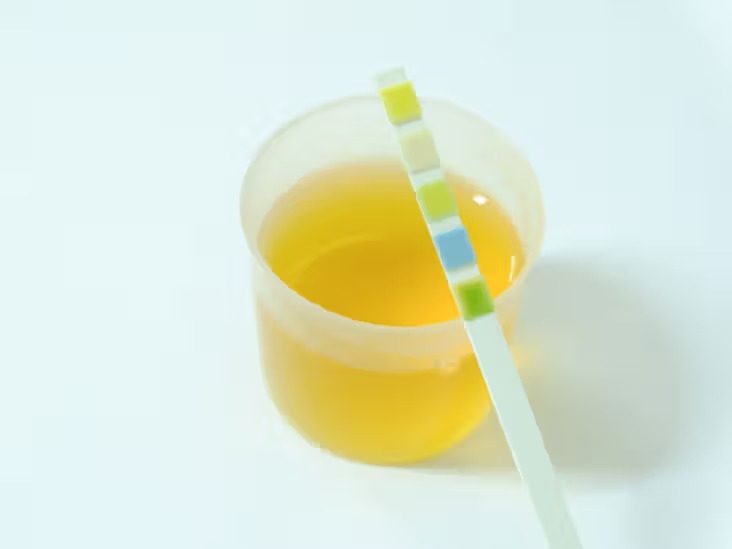Table of Contents
Kidney stones are a painful and often recurring health issue that affects millions of people worldwide. While traditional treatments exist, recent research has shed light on a simple, natural remedy that could be a game-changer in kidney stone prevention apple cider vinegar.
This article explores the causes of kidney stones, explains how apple cider vinegar can help, and provides practical tips for incorporating this remedy into your daily routine. Whether you’ve experienced kidney stones before or want to prevent them, this information could be crucial for maintaining your kidney health.
Kidney stone prevention

Kidney stones can be devastating, causing severe pain. For those who have experienced kidney stones or are interested in preventing them, this topic is for you.
I’ve talked a lot about kidney stones, but I haven’t emphasized one really important factor based on a recent study I just read. It’s fascinating and involves adding a simple thing to your water: apple cider vinegar.
Apple cider vinegar is mostly acetic acid. The question is, how does acetic acid influence or help you dissolve stones?
Summary:
- Kidney stones are extremely painful
- The video focuses on a new important prevention factor
- Adding apple cider vinegar (acetic acid) to water may help dissolve stones
Kidney stones explained
When dealing with kidney stones, we’re mainly talking about calcium oxalate stones. There are other types too, like uric acid stones, but calcium oxalate is most common. I’ve done videos on oxalates, which are found in many foods, especially in the ketogenic diet. They’re high in almonds, spinach, chocolate, and kiwis.

Another factor is calcium in the urine, which can be due to a genetic weakness or mutation. Many people who have kidney stones or a tendency to get osteoporosis may have a genetic problem that causes them to release a lot of calcium in the urine.
Summary:
1. Most kidney stones are calcium oxalate stones
2. Oxalates are found in foods like:
– Almonds
– Spinach
– Chocolate
– Kiwis
3. High urinary calcium may be due to genetic factors
How to prevent kidneys stones
Typically, the scenario for kidney stones involves high oxalates, high calcium, and low citrates. Citrates, which you might associate with citrus fruits like lemons and limes, are also produced by your body. Low citrates are often part of the problem with kidney stones because citrates can act as a chelator, binding to calcium and reducing the amount of free calcium that can bind with oxalates.

Citrates are used in industrial cleaning agents to remove rust from steel and calcium carbonate. They’re also involved in the Krebs cycle, also known as the citric acid cycle, which is important for energy production.
To prevent kidney stones, you can start consuming more lemons or limes. I recommend adding lemon juice to your morning water. Drinking more fluid in general helps dilute the urine, preventing the supersaturated situation that leads to stone formation. Aim for at least 2.5 liters of water or other fluids daily.

If you have kidney stones or are developing a stone, you should consume a lot of lemon juice, maybe four to six ounces a day. For prevention, you can use the juice from one lemon or a tablespoon of lemon juice.
Adding apple cider vinegar is also beneficial. It can help with the genetic problem of excess calcium in the urine by causing significant reabsorption of citrates, keeping more citrates in your urine and preventing the formation of oxalates with calcium.
You can also add additional citrates from potassium citrate or magnesium citrate, found in various electrolyte powders. Drinking one, two, or even three of these a day may help prevent kidney stones.
Summary:
Prevention strategies:
- Increase citrate intake:
- – Add lemon juice to water
- – Consume 4-6 oz of lemon juice daily if prone to stones
- – Use citrate supplements (potassium or magnesium citrate)
- Stay hydrated:
- – Drink at least 2.5 liters of fluids daily
- Use apple cider vinegar:
- – Helps reabsorb citrates
- – Prevents calcium-oxalate binding
- Consider electrolyte powders with citrates
Summary
- The most common type of kidney stone is a calcium oxalate stone. In this situation, you have high oxalates and calcium and low citrate.
- You may have high oxalates from consuming too many high-oxalate foods. Oxalates are in a lot of foods, including keto-friendly foods. High calcium in the urine can be due to a genetic mutation.
- Your body makes citrates, which bind with calcium to lessen the amount of free calcium in the body. Free calcium is what can bind to oxalates.
- Drinking more fluids during the day is one of the best ways to prevent kidney stones. I suggest drinking at least two and a half liters of fluids per day if you’re prone to getting kidney stones. Another great way to prevent kidney stones is to add electrolyte powder containing potassium citrate or magnesium citrate to your water.
DATA
https://pubmed.ncbi.nlm.nih.gov/25542071
FAQ
What is the fastest way to dissolve a kidney stone?
- Lemon Juice and Olive Oil: Some people claim mixing 1/4 cup of lemon juice and 1/4 cup of olive oil, then drinking the mixture, can help break down kidney stones. The citric acid in lemon juice may help dissolve the stones, while the olive oil may aid in flushing them out.
- Apple Cider Vinegar: The acetic acid in apple cider vinegar is thought to help dissolve kidney stones by altering the pH of the urine. Mixing 2 tablespoons of apple cider vinegar in 6-8 ounces of water and drinking it several times a day may be beneficial.
- Basil Juice: Basil contains acetic acid that may help dissolve stones. Consuming 1 teaspoon of basil extract or juice per day could potentially help.
However, it’s important to note that the effectiveness of these home remedies is not conclusively proven, and they may not work for all types or sizes of kidney stones. Consulting a doctor is recommended before trying any home treatments.
What is the fastest way to flush your kidneys?
The fastest way to flush your kidneys is to drink plenty of water. Staying well hydrated helps dilute your urine and flush out substances that can form kidney stones. Experts recommend drinking at least 8-10 glasses of water per day, and even more if you’re actively trying to pass a stone.
Other fluids that can help flush the kidneys include:
- Lemon juice: The citric acid in lemon juice can help increase urine citrate levels, which can prevent stone formation.
- Cranberry juice: Cranberry juice may help prevent the formation of certain types of kidney stones.
- Green tea: Green tea contains compounds that may help inhibit stone formation.
In addition to staying hydrated, you can also help flush your kidneys by:
- Limiting sodium intake, as high sodium levels can contribute to stone formation.
- Eating more calcium-rich foods, as dietary calcium binds to oxalate in the intestines, reducing its absorption.
- Avoiding foods high in oxalate, such as spinach, rhubarb, and nuts.
What is the best drink for kidney stones?
The best drink for kidney stones is water. Staying well hydrated is the most important factor in preventing and passing kidney stones. Experts recommend drinking at least 8-10 glasses of water per day, and even more if you’re actively trying to pass a stone.
Other drinks that may be beneficial for kidney stones include:
- Lemon juice: The citric acid in lemon juice can help increase urine citrate levels, which can prevent stone formation.
- Orange juice: Like lemon juice, orange juice is high in citrate and may help reduce the risk of kidney stones.
- Coffee: Moderate coffee consumption has been associated with a lower risk of kidney stone formation.
- Green tea: Green tea contains compounds that may help inhibit stone formation.
Drinks to avoid or limit when dealing with kidney stones include:
- Soda: The high levels of phosphoric acid in soda can increase the risk of kidney stones.
- Grapefruit juice: Grapefruit juice may increase the risk of certain types of kidney stones.
- Alcohol: Alcohol can lead to dehydration, which can increase the risk of kidney stone formation.
Can a 5mm kidney stone dissolve?
It is possible for a 5mm kidney stone to dissolve, but the likelihood depends on the stone’s composition and the effectiveness of the treatment. Here’s a more detailed look:
- Smaller stones (5mm or less) are generally more likely to pass on their own or dissolve with conservative treatment compared to larger stones.
- The composition of the stone is a key factor. Stones made of uric acid or cystine are more resistant to dissolution, while stones made of calcium oxalate or calcium phosphate may be more responsive to certain treatments.
- Medications like thiazide diuretics or citrate supplements can help increase urine citrate levels, which can aid in dissolving calcium-based stones.
- Dietary changes, such as increasing fluid intake, reducing sodium, and limiting foods high in oxalate, may also help promote stone dissolution.
- In some cases, a 5mm stone may require more aggressive treatment, such as shock wave lithotripsy (ESWL) or ureteroscopy, to break it up and facilitate passage.
While a 5mm stone has a better chance of dissolving compared to larger stones, it’s still important to work closely with a urologist to determine the best course of treatment based on the individual stone characteristics and the patient’s medical history.
Is apple cider vinegar harmful for kidneys?
Apple cider vinegar is generally considered safe for most people, including those with kidney issues, when consumed in moderation. However, there are a few potential concerns regarding its use for kidney health:
- Acidity: Apple cider vinegar is acidic, with a pH around 2-3. Consuming large amounts over a long period could potentially contribute to the development of kidney stones in people prone to them.
- Potassium levels: Apple cider vinegar contains a small amount of potassium. For individuals with kidney disease or taking certain medications, high potassium intake could be problematic.
- Interactions with medications: Apple cider vinegar may interact with some medications, such as diuretics, insulin, and certain heart medications. Consulting a healthcare provider is advised before using it.
- Digestive issues: Consuming undiluted apple cider vinegar can cause throat irritation, nausea, and other digestive problems in some people.
To minimize the risks, it’s recommended to dilute apple cider vinegar in water or juice and limit consumption to a few tablespoons per day. Individuals with kidney disease or other underlying health conditions should consult their healthcare provider before using apple cider vinegar.
What dissolves kidney stones fast?
There are a few treatments and home remedies that may help dissolve kidney stones faster:
- Medications:
- Thiazide diuretics: These medications can help increase urine citrate levels, which can aid in dissolving calcium-based stones.
- Citrate supplements: Increasing citrate in the urine can help break down stones.
- Alkalizers: For uric acid stones, medications that make the urine less acidic can help dissolve the stones.
- Home Remedies:
- Lemon juice and olive oil: The citric acid in lemon juice may help dissolve stones, while the olive oil may aid in flushing them out.
- Apple cider vinegar: The acetic acid in apple cider vinegar may help alter the pH of the urine, potentially dissolving stones.
- Basil juice: Basil contains acetic acid that may help dissolve stones.
- Increased Fluid Intake:
- Drinking plenty of water is one of the most effective ways to help flush out and potentially dissolve kidney stones.
It’s important to note that the effectiveness of these treatments can vary depending on the size, location, and composition of the kidney stone. Consulting a healthcare provider is recommended to determine the best course of action for your specific situation.
Can a 7mm kidney stone dissolve?
It is generally more difficult for a 7mm kidney stone to dissolve compared to smaller stones. Here’s a more detailed look:
- Kidney stones larger than 5mm in diameter are less likely to pass on their own and may require more aggressive treatment.
- The composition of the stone is a key factor in determining if it can be dissolved. Stones made of uric acid or cystine are more resistant to dissolution, while stones made of calcium oxalate or calcium phosphate may be more responsive to certain treatments.
- Medications like thiazide diuretics or citrate supplements can help increase urine citrate levels, which can aid in dissolving calcium-based stones. However, these treatments are generally more effective for smaller stones.
- Dietary changes, such as increasing fluid intake, reducing sodium, and limiting foods high in oxalate, may also help promote stone dissolution, but their effectiveness may be limited for larger stones.
- In many cases, a 7mm kidney stone may require more invasive treatments, such as shock wave lithotripsy (ESWL) or ureteroscopy, to break up the stone and facilitate its passage.
While it is possible for a 7mm kidney stone to dissolve with the right treatment and management, the likelihood is lower compared to smaller stones. Consulting a urologist is recommended to determine the best course of action based on the individual stone characteristics and the patient’s medical history.
How long does it take apple cider vinegar to remove kidney stones?
The effectiveness of using apple cider vinegar to remove kidney stones can vary, and there is limited scientific evidence to support its use as a reliable or fast-acting treatment.
Some key points about using apple cider vinegar for kidney stones:
- There is no definitive timeline for how long it may take apple cider vinegar to remove a kidney stone. The time frame can range from a few days to several weeks, depending on the size and composition of the stone.
- The proposed mechanism is that the acetic acid in apple cider vinegar may help alter the pH of the urine, making it less acidic and potentially helping to dissolve certain types of kidney stones, such as uric acid stones.
- However, the evidence for apple cider vinegar’s effectiveness in dissolving or removing kidney stones is mostly anecdotal, and more research is needed to confirm its efficacy.
- Larger or more stubborn stones are less likely to be effectively dissolved by apple cider vinegar alone. Larger stones may require more aggressive medical treatments, such as lithotripsy or surgery.
- It’s important to consult with a healthcare provider before using apple cider vinegar or any other home remedy for kidney stones, as they can provide guidance on the best course of treatment based on the individual’s specific condition.
In summary, while some people report success using apple cider vinegar for kidney stones, the timeline for its effectiveness can vary greatly and is not well-established scientifically. Seeking professional medical advice is recommended for managing kidney stones.
Lemon juice and kidney stones myth
- Citrate content: Lemon juice does contain citrate, which is thought to help prevent the formation of certain types of kidney stones by increasing citrate levels in the urine. However, the amount of citrate in lemon juice may not be high enough to significantly impact stone dissolution.
- Lack of clinical studies: While some small studies have suggested lemon juice may have a modest effect on stone prevention, there is a lack of robust clinical evidence demonstrating that lemon juice can effectively dissolve or facilitate the passage of existing kidney stones.
- Stone composition matters: The effectiveness of lemon juice (or any treatment) depends on the specific composition of the kidney stone. Stones made of uric acid or cystine are less likely to respond to lemon juice compared to stones made of calcium oxalate or calcium phosphate.
- Hydration is key: Drinking plenty of water is widely recognized as one of the most important factors in preventing and passing kidney stones. The benefits of lemon juice may be more related to its ability to encourage increased fluid intake rather than any direct stone-dissolving properties.
While lemon juice is generally safe and may have some potential benefits, it should not be relied upon as a standalone treatment for actively dissolving or passing kidney stones. Consulting a healthcare provider is recommended for the most effective management of kidney stones.
Is apple cider vinegar high in oxalates?
No, apple cider vinegar is not considered high in oxalates. Oxalates are organic compounds that can contribute to the formation of kidney stones, and people with a history of kidney stones are often advised to limit their intake of high-oxalate foods.
Here are some key points about the oxalate content of apple cider vinegar:
- Low oxalate content: Apple cider vinegar is made from fermented apple juice and contains very little, if any, oxalates. The oxalate content is generally considered negligible.
- Comparison to other foods: In comparison, foods that are high in oxalates include spinach, beets, rhubarb, nuts, and certain beans. These foods contain significantly higher amounts of oxalates compared to apple cider vinegar.
- Potential benefits for kidney stones: Some research suggests that the acetic acid in apple cider vinegar may actually help prevent the formation of certain types of kidney stones by altering the pH of the urine. This is thought to be one of the potential benefits of consuming apple cider vinegar for individuals prone to kidney stones.
- Moderation is still advised: While apple cider vinegar is not high in oxalates, consuming large amounts over a long period could potentially contribute to kidney stone formation in some individuals. Moderation is still recommended, especially for those with a history of kidney stones.




